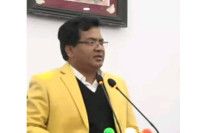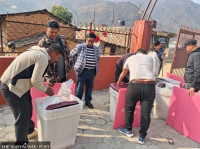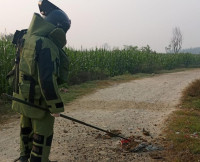National
Health care services in disarray due to lengthy bureaucratic process, officials say
Health workers complain that several programmes of the health sector have been affected by the lengthy process created under the federal system.
Arjun Paudel
Tensions ran high in Seti Zonal Hospital of Sudurpaschim Province last Friday following the death of a new mother.
Rekha Thapa, 20, of Jugeda, of Dhangadhi Sub-Metropolitan City, who had given birth to a child on Wednesday, died on her way to another hospital, after doctors at the Seti Hospital referred her to a medical college in Kohalpur.
Relatives of the deceased accused the doctors and health workers at the Seti Hospital of negligence and rallied against the hospital authorities. The situation escalated quickly and security personnel had to be deployed to control the uproar.
Chief district officer, chief of Regional Health Directorate, chief of local governments, leaders of all political parties and civil society members gathered at the hospital to control the situation.
Dr Guna Raj Awasthi, chief of the Regional Health Directorate in Sudurpaschim Province, said the hospital and other concerned officials accepted the demands made by the deceased’s relatives to control the mob from getting out of hand.
The deceased’s relatives had also demanded a fair investigation. In relation to the investigation, Awasthi decided to call upon a team of experts from Kathmandu. And for that, he rang up Dr Pushpa Chaudhary, secretary at the Ministry of Health and Population on Friday midnight. However, his request was turned down.
“I was told to follow the due process, which meant I had to write to Social Development Ministry of Sudurpaschim Province,” Awasthi, who is currently in Kathmandu, told the Post. “As per the process, the provincial ministry then had to write to the Office of the Chief Minister which would in turn write to the Office of the Prime Minister and Council of Ministers.”
The Health Ministry would have been in a position to intervene only after it received instructions to that effect from the Office of the Prime Minister.
“It is such a cumbersome process. There was an emergency and the crowd was angry,” Awasthi said. “I told Chaudhary that the crowd could resort to more violence. I pleaded with her to understand the sensitivity of the issue.” Chaudhary then directed concerned officials at the ministry who sent Dr Sandesh Poudel, an expert to the hospital, on Saturday, to carry out the investigation.
Though the matter was sorted out, this case stands an example on how the new governance structure—with a labyrinthine process—is posing challenges when it comes to dealing with emergencies, especially concerning health issues.
Health workers complain that several programmes of the health sector have been affected by the lengthy process created under the federal system.
“If there is any sector that has been highly affected by the lengthy process of federalism, it is the health sector,” said Dr Bibek Kumar Lal, director at the Epidemiology and Disease Control Division under the Department of Health Services.
“Sometimes we need to conduct training and orientation programmes for health workers on short notice, but this is not possible since we have to go through a long and tedious process.”
Health officials also worry how they will deal with epidemics—if they should arise—if they have to follow such a lengthy bureaucratic process for everything.
Earlier the division used to maintain communications with local health facilities through phone calls and emails but with the implementation of federalism, officials said they are going back in time since they now have to “write letters”.
Mahendra Prasad Shrestha, chief of Health Cooperation Division at the Health Ministry, said that his ministry was aware of the problems faced by concerned officials.
“Yes, processes are taking a lot of time, even for minor issues. There is nothing we can do now. We have already adopted federalism and the governance structure demands that process. There is no other way than getting used to it,” said Shrestha.
When asked how the agencies plan to deal with emergencies, Shrestha said, “Such situations have not arisen yet. We will cross that bridge when we get there.”




 11.16°C Kathmandu
11.16°C Kathmandu















